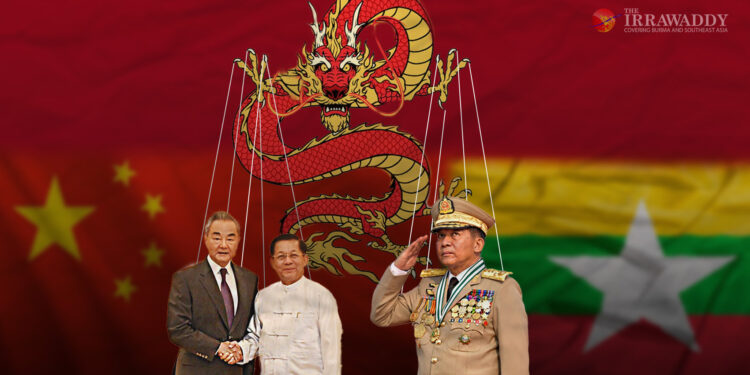As the junta suffered an unprecedented string of military defeats, Chinese Foreign Minister Wang Yi arrived Naypyitaw in August 2024 to meet the ruling generals. Since then, the regime has been dancing to Beijing’s tune, raising questions about whether it is becoming a puppet regime of its northern neighbor.
China initially distanced itself from the regime after the Myanmar military ousted the elected government in a coup in 2021. However, during Wang’s visit, Beijing threw its weight behind the junta’s activities, including its proposed election, and voiced opposition to ethnic armed groups’ attacks in northern Shan State.
China’s support has not come without strings. Min Aung Hlaing was forced to guarantee the smooth operation of the China-Myanmar oil-and-gas pipeline and the safety of Chinese projects and employees. China proposed forming a joint security company to protect its interests in Myanmar, and shortly after Wang’s visit, the regime formed a committee to facilitate the signing of a memorandum of understanding on establishing such a company. The move has led to a public outcry, as many view it as an infringement on Myanmar’s sovereignty.
Desperate for China’s help to stop ethnic rebels’ advances in northern Myanmar, and for its diplomatic support on the international stage, the regime has toed the line by expressing firm support for Beijing’s One China policy in regards to Taiwan, and committing to safeguarding the safety of Chinese projects and personnel in Myanmar.
Despite the civil war and dire security situation in Myanmar, the regime is bending over backwards to kickstart the stalled Kyaukphyu Special Economic Zone and deep-sea port project, a crucial plank in Beijing’s China-Myanmar Economic Corridor (CMEC) linking landlocked Yunnan Province with the Indian Ocean through Myanmar.
When Min Aung Hlaing made his first post-coup visit to China in November last year, the junta boss assured Chinese Premier Li Qiang that construction work on the Muse-Mandalay-Kyaukphyu railway project, which will link western Myanmar’s Rakhine State with Yunnan Province through central and northeastern Myanmar, would kick off in areas where conditions allowed. He buttered up the Chinese premier, saying Myanmar was putting its heart and soul into the CMEC.
Moreover, for the first time in the 75 years of Myanmar-China diplomatic relations, the regime declared Chinese New Year a public holiday.
In 2001, amid conflicts with Thailand, Myanmar military sympathizers mocked Thailand’s pride at never having been colonized or losing its independence, claiming the country had in fact been enslaved in the 19th century when it yielded to the demands of imperial powers like Britain and France.
A retired judge from Yangon compares today’s Myanmar to those military supporters’ characterization of Thailand in the age of empire. Although Myanmar and China are not at war, China is now calling the shots in Myanmar, with Min Aung Hlaing going along with all of Beijing’s demands, he said.
“Now, it seems like Myanmar is becoming a servile nation [of China] despite not being publicly subjugated,” he remarked in dismay.
Hit by Western sanctions in the 1990s and 2000s, the regime of previous Myanmar military dictator Than Shwe was forced to lean on China for political, economic, diplomatic and military support. However, Min Aung Hlaing has gone far beyond his predecessors by declaring Chinese New Year a public holiday and enacting laws that allow Chinese armed security personnel to operate in Myanmar.
The decision regarding Chinese New Year has prompted criticism that Min Aung Hlaing has sacrificed Myanmar’s integrity in exchange for Chinese help in maintaining his grip on power. To find earlier examples of Myanmar observing foreign holidays, one would have to look back to pre-independence times. During British colonial rule, Myanmar officially observed public holidays such as Good Friday, Easter Monday, the British Monarch’s Birthday, and Empire Day. Similarly, during the Japanese occupation, Myanmar observed the anniversary of the founding of the Japanese Empire and the Emperor’s Birthday as public holidays.
Recently, the regime passed the Private Security Services Law, enabling Chinese private security companies to set foot on Myanmar’s soil. In so doing, it ignored a constitutional provision prohibiting foreign troops from being stationed in Myanmar, not to mention widespread public concerns about the possible threat to national sovereignty.
On the most recent Chinese New Year, Min Aung Hlaing stated that China’s Belt and Road Initiative (BRI) aims not only to promote its own national development, but also to boost the development of regional and global nations, including Myanmar. He praised China as a regional leader, expressing his commitment to implement various CMEC projects.
In return, the junta boss requested China’s assistance for Myanmar’s “peace process” and national development.
China duly pressured ethnic rebels near its border including the Brotherhood Alliance to stop fighting the regime, just as they were gaining the upper hand in the fighting. It closed border crossings and restricted exports to them as it forced them to join peace talks with the regime.
China told the Ta’ang National Liberation Army to stop its offensives or face punitive action. This sparked strong criticism from the Myanmar public that China was intervening in Myanmar’s internal affairs.
Under Chinese pressure, the Myanmar National Democratic Alliance Army, which seized several towns in northern Shan State including its capital Lashio, has agreed to a ceasefire with the regime. The public learned about the ceasefire only through China’s announcement, leading to questions and criticism among the people about whether northeastern Myanmar has become a province of China.
While the regime cozies up to Beijing, some Chinese individuals are taking outrageous liberties. Some have even live-streamed invitations for Myanmar women to become their brides in front of the palace wall in Mandalay, Myanmar’s former royal capital. Others have tried to woo teenage girls from poor families in Yangon, dangling money before them in an effort to convince them to marry Chinese men. Videos of such activities have been shared on Chinese social media platforms, showing complete disregard for the feelings of Myanmar people.
Meanwhile, swarms of Chinese criminals and fraudsters have been making hay while the sun shines on Myanmar’s land. From northern Shan State to the Thailand-Myanmar border, Yangon, and Mandalay, they’re running rampant operating online scams. Such audacity is unheard of in the annals of Myanmar-China relations. The regime, well aware of these fraudulent activities, played ostrich initially. It was only when the Chinese government cracked the whip that the regime started tackling cybercrime, declaring it a national duty and again toeing the Chinese line by arresting and clamping down on scam gangs.
The junta’s Ministry of Hotels and Tourism, anticipating an influx of Chinese visitors, has been running Chinese-language courses and Chinese culinary training courses with help from Yunnan chefs as part of its plans to open Chinese restaurants in popular destinations. For now, nothing seems more important for the regime than to keep China happy.

















